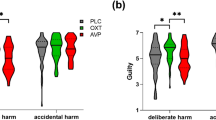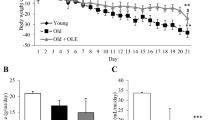Abstract
Friedman and Friedman1 recently reported that chronic administration of a crude extract of the posterior pituitary gland extended the life-span of old male rats. They postulated that this effect resulted from changes caused by vasopressin in the metabolism of water and salts. Vasopressin alone, however, failed to produce prolongation of life in the aforementioned experiments. More recently, they have extended their investigations to the effect of aldosterone.
This is a preview of subscription content, access via your institution
Access options
Subscribe to this journal
Receive 51 print issues and online access
$199.00 per year
only $3.90 per issue
Buy this article
- Purchase on SpringerLink
- Instant access to the full article PDF.
USD 39.95
Prices may be subject to local taxes which are calculated during checkout
Similar content being viewed by others
References
Friedman, S. M., and Friedman, C. L., Nature, 200, 237 (1963).
Friedman, S. M., and Friedman, C. L., Exp. Gerontology, 1, 37 (1964).
Author information
Authors and Affiliations
Rights and permissions
About this article
Cite this article
BODANSZKY, M., ENGEL, S. Oxytocin and the Life-span of Male Rats. Nature 210, 751 (1966). https://doi.org/10.1038/210751a0
Issue date:
DOI: https://doi.org/10.1038/210751a0



